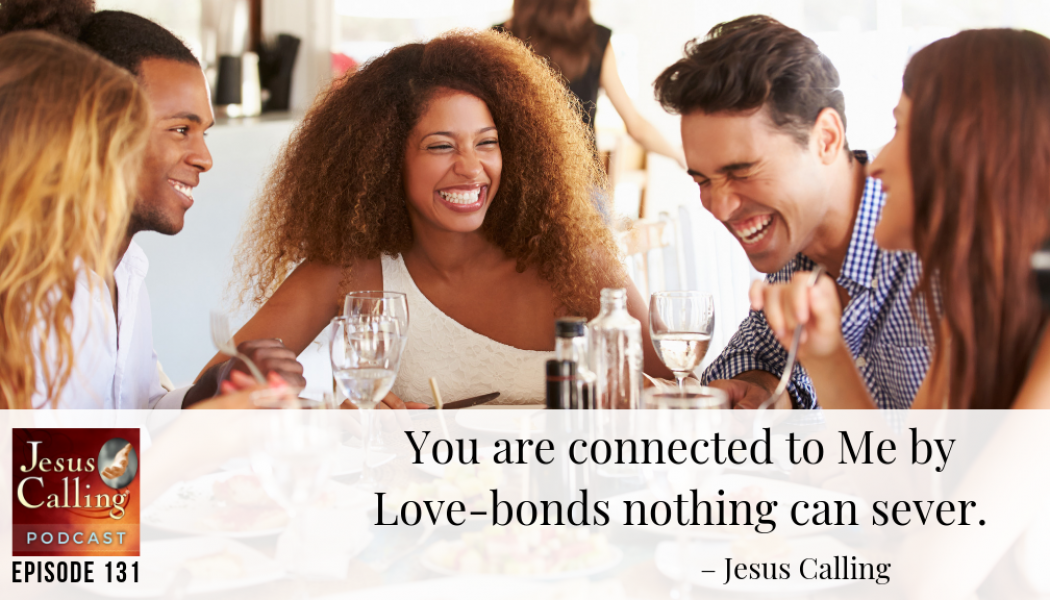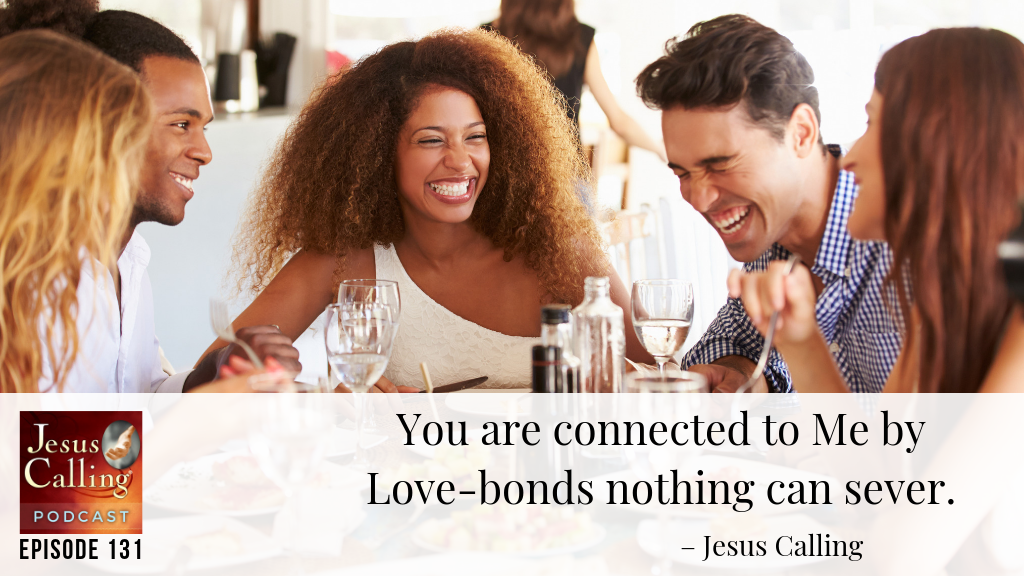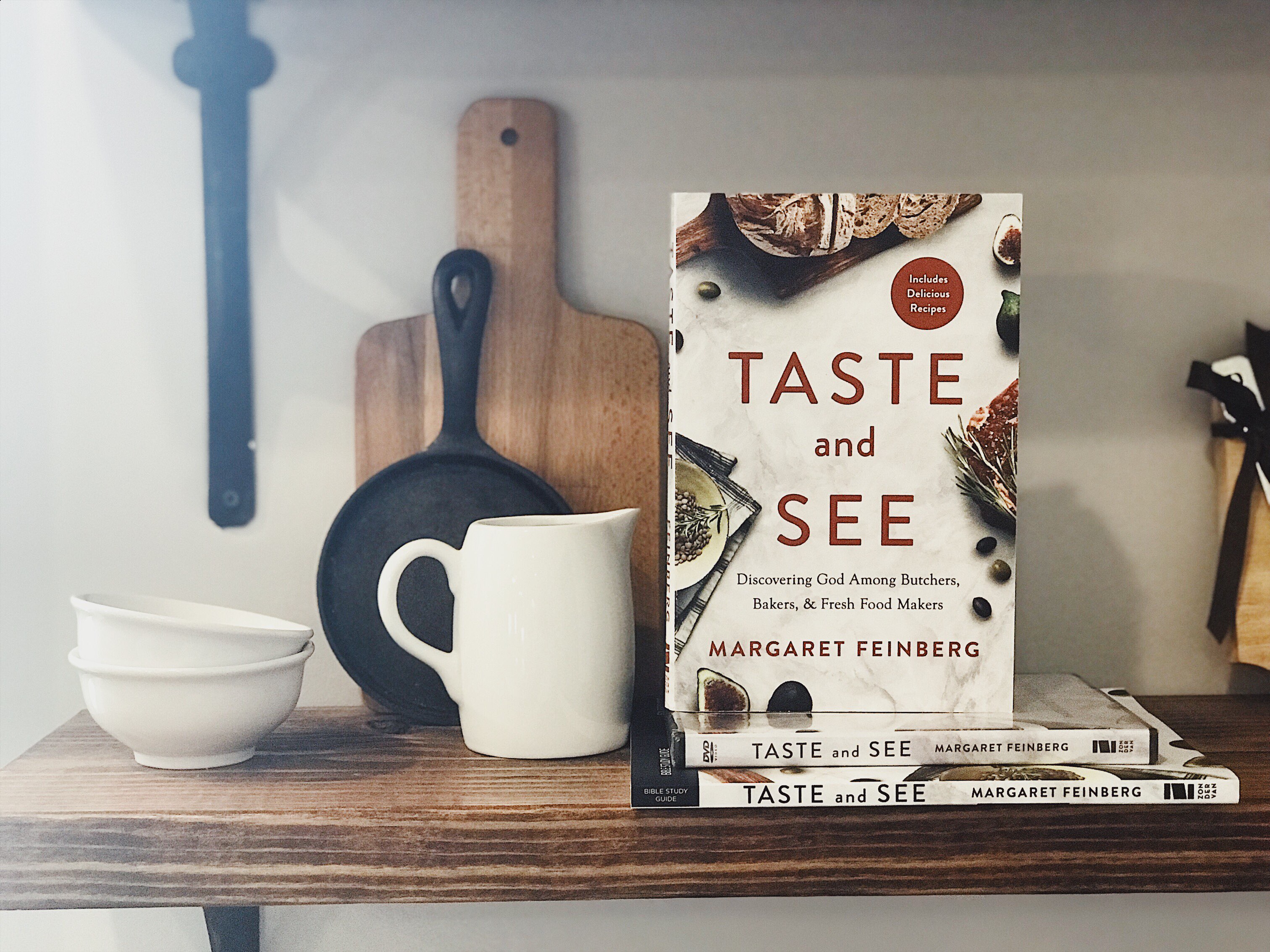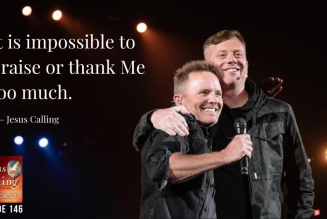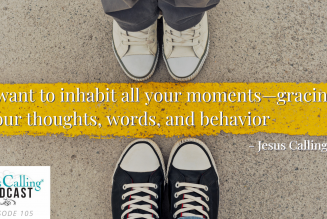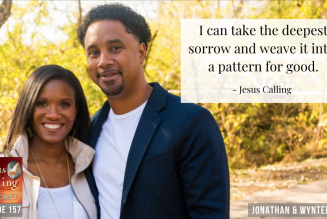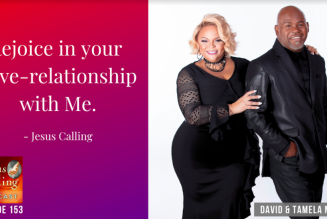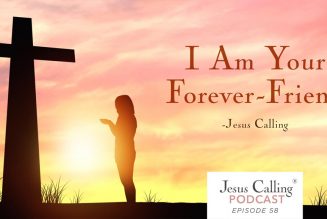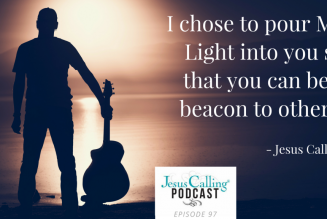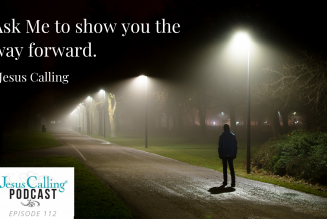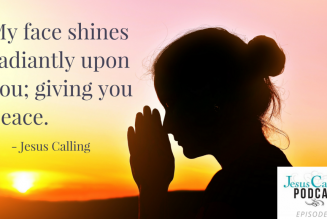Darlene Zschech and Margaret Feinberg have seen God’s presence woven into the fabric of their lives and realized He’s closer to us in ways we might have never imagined. First up, Darlene Zschech grew up in Australia and found commercial success in music at age 10, but decided to leave a career as an entertainer to seek a life in worship and ministry. During In 1993, during a stressful time in her life Darlene found herself at her piano, prayerfully singing her heart to God. The words that flowed out eventually became one of most recognized praise and worship songs of the modern era: “Shout to the Lord.” Now she and her husband pastor together at Hope Unlimited Church. She shares about the joys and heartaches of being a pastor, and writes candidly about her cancer journey in her new book The Golden Thread. Beloved Bible teacher Margaret Feinberg has been writing for more than 20 years. She tells us about her early experiences growing up with parents who moved around quite a bit, and how that shaped Margaret’s curiosity and love of exploring different people and cultures. Margaret uses that curiosity in her new book Taste and See: Discovering God Among Butchers, Bakers, and Fresh Food Makers, where she shares a culinary exploration of Scripture that profoundly changed the way she viewed gatherings around food forever.
Darlene Zschech: I know that I know that I know that His presence just changes everything. I want everyone to experience that and know that they don’t have to wait for Sunday. The same power that raised from the dead is alive in us. So we actually live in the power of this promise every moment of every day.
True Connection with God and Each Other: Darlene Zschech & Margaret Feinberg – Episode #131
Narrator: Welcome to the Jesus Calling Podcast. Today’s guests are two women who have seen God’s presence woven into the fabric of their lives and realized He’s closer to us in ways we might have never imagined: worship leader, pastor, and writer Darlene Zschech, and Bible teacher Margaret Feinberg.
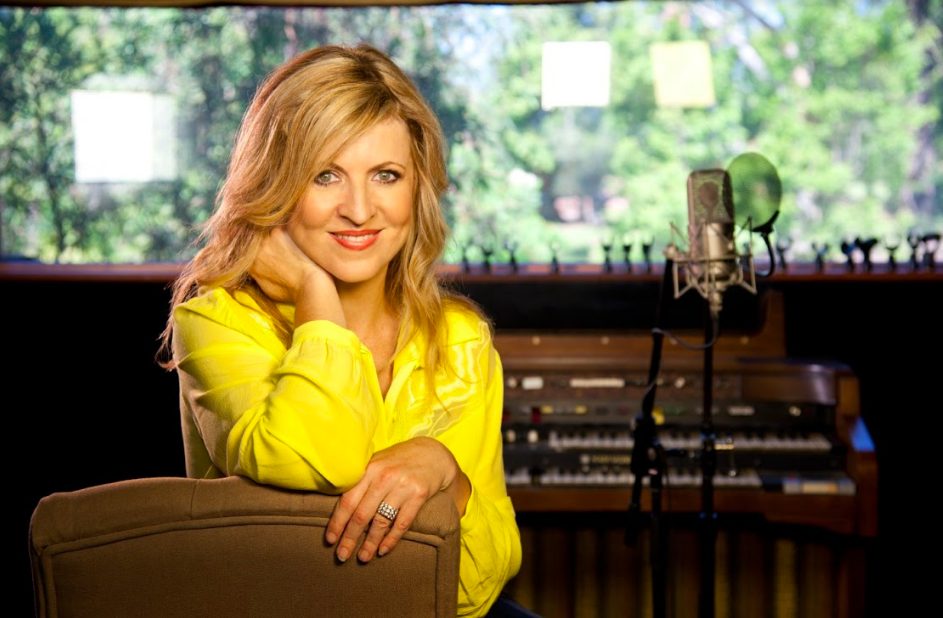 First up, Darlene Zschech grew up in Australia and found commercial success in music at age 10, but decided to leave a career as an entertainer to seek a life in praise and worship ministry. In 1993, during a stressful time in her life, Darlene found herself at her piano, prayerfully singing her heart to God. The words that flowed out of her heart became one of most recognized praise and worship songs of the modern era: “Shout to the Lord.” Now she and her husband pastor together at Hope Unlimited Church. She shares about the joys and heartaches of being a pastor, and writes candidly about her cancer journey, reconciling that with her faith and her public persona in her new book The Golden Thread.
First up, Darlene Zschech grew up in Australia and found commercial success in music at age 10, but decided to leave a career as an entertainer to seek a life in praise and worship ministry. In 1993, during a stressful time in her life, Darlene found herself at her piano, prayerfully singing her heart to God. The words that flowed out of her heart became one of most recognized praise and worship songs of the modern era: “Shout to the Lord.” Now she and her husband pastor together at Hope Unlimited Church. She shares about the joys and heartaches of being a pastor, and writes candidly about her cancer journey, reconciling that with her faith and her public persona in her new book The Golden Thread.
Darlene Zschech: My name is Darlene Zschech. I am a wife and a mom and a grandma. My husband Mark and I pastor a church on the central coast of New South Wales in Australia called Hope Unlimited Church, which we love doing. I’m also a writer of songs and books and all sorts of things.
The Worshiper Begins to Rise
I grew up in Queensland in Australia, the eldest of four kids. My grandparents, actually, on my dad’s side [were] very strong Christian people. I really think I’m here today because of their prayers. Every morning they prayed for us by name.
There were earlier days where I remember [being] in church, being around worship, being around the presence of God and the people of God. And I know something was really birthed in my heart from a young age, but I never knew how to have a relationship with God.
How I came to become a Christian was my family went through a terrible breakup, as many families do. I found myself at 15 living out of home, renting a little room in a family’s home that went to a church. So during that season, my father ended up rededicating his life to Christ, came and picked me up from where I lived, took me to the church that this family went to, and I got radically born again from that time on.
And so when my heart came alive in Christ at 15, so many things made sense to me that really I had never been able to reconcile. I had auditioned for children’s national television show when I was a kid, and I got into that. I was full time on television from the age of 10 to 15. I was working primarily full-time, trying to do school. I was successfully always in the magazines and all of those things, so I had this little career as a kid but couldn’t really reconcile my spirituality.
Then I was in a band at my new church, met the drummer, and yeah, we fell in love. All we really wanted to do was ministry, youth ministry, any kind of ministry. So you know, that’s kind of how I started doing ministry.
I’ve always loved music. I could sing the songs, I could hit the notes. I did jingles for years. I could sing about a chip, McDonald’s, Coke.
For me, I became restless with music. This is where this worshiper was starting to emerge. I had to unlearn “the entertainer.” I was all singing, all dancing. I could sing a song and perform, and then God says to me, “You don’t ever Have to perform for Me.” But I’m like, But I don’t know How else to do it!
The performer had to really die so the worshiper could rise. And that has been my journey. I’m still on the journey. And you know, one day when I take my final breath here on earth, I’ll just take my first one in heaven, and I’ll just continue in worship. It’s pretty awesome.
“The performer had to really die so the worshiper could rise. . . . I’m still on the journey.” – Darlene Zschech
The Story Behind “Shout to the Lord”
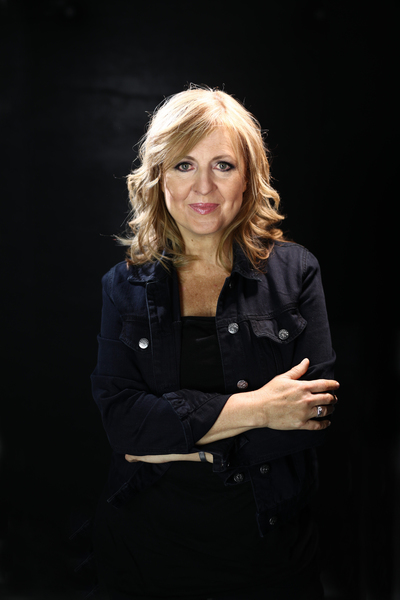 “Shout to the Lord,” I always say I can’t really take credit for writing it.
“Shout to the Lord,” I always say I can’t really take credit for writing it.
I’ll never forget that day because we were running business out of our home. We were a full time ministry in our hearts, but there was no job. We couldn’t afford to be on staff, and actually, I never wanted to be paid by the church. I just felt like they could do other things with the money.
Our business wasn’t doing well. I remember getting this bill in the mail, and I just went and shut myself in the room next door, which housed an old piano that my parents gave me when I was five when I got my tonsils out, because I always loved music. I just sat on there, and I opened the Word. And between Psalm 96 and Psalm 100 is “Shout to the Lord.” And I just worshiped, just played and sang and . . . “My Jesus, My Savior.” It just was really natural. I wasn’t writing, I was worshiping. So after I’m like, “I think that’s a song.” But I was never confident as a songwriter.
A couple of months later, I took it to our worship pastor. I said, “I might have written a song. I don’t know.” I made him and the music director stand with their backs [to me]. I was on the piano—they could tell you the story—and I’m like, “‘My Jesus—’ Change that line if you don’t like it, I just really don’t know if I’m a songwriter—‘My Savior.’” I just apologized the whole way through. And at the end, the music pastor turned around and was teary and said, “Thank you. That’s Beautiful.”
We sang it the next week in church, just over an offering. I remember people standing up in the middle. I’m like, “What’s happening?” And literally from that day, the song left my lips and it just took a life of its own.
“Literally from that day, the song [Shout to the Lord] left my lips and it just took a life of its own.” – Darlene Zschech
I remember getting a phone call from an American pastor, and he was calling to say thank you for the song. I was in the office volunteering, and I kept saying to them, “He couldn’t want to talk to me. Put them through to Pastor Brian.” And then they’d send the phone call back and I’m like, “No, he couldn’t [want to] talk to me.” And finally this pastor said, “I just want to say thank you for that song.”
I was getting letters from crazy places. A story in our country, actually, a pastor and some friends were in a boat that capsized. One of the men died, drowned, and the others sang “Shout to the Lord.” And the miracle that happened. Part of that story is just crazy.
So many stories, so varied. It’s just God’s story, and I’m so so thankful.
Healing the Ache to Belong
There’s an ache in people across the earth and in the church, an ache to belong.
When Jesus walked around the earth, what did He walk around doing? He preached to the masses, but then He also saw the one. He encouraged us around fellowship, around tables, around eye contact, around laying on of hands, around those things that actually require vulnerability of relationship. I think people are aching for a relationship.
“There’s an ache in people across the earth and in the church, an ache to belong . . . people aching for relationship.” – Darlene Zschech
The beauty of the church is about family and about there’s a place for you here.
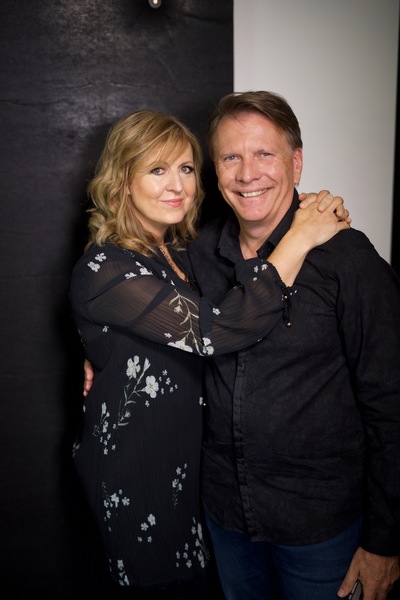 We come together to be fueled—not to be entertained, to come and be fueled so that we can go. We come together as the body. That means if you’re not there, then we’re missing something.
We come together to be fueled—not to be entertained, to come and be fueled so that we can go. We come together as the body. That means if you’re not there, then we’re missing something.
I think that there is this urgency for us to open our hands wider, open our arms wider. No judgment. You come and you’re going to be seen, and you’re going to see me, and we going to connect and we’re going to pray. I’m going to believe for your miracle, and you’re going to believe for my miracle. And together, we are the church. We’re part of the Kingdom of God. And then the most exciting bit: We get to go and we get to be His hands and feet wherever we go.
I’m excited to see what’s going to happen in the years to come as we get vulnerable again and sit at tables together and believe God for the impossible
What I love about pastoring, I love just being with the people in the trenches. I love being in hospitals. I love being at people’s bedsides. I think it’s the most profound privilege to be there when there’s birth and when there’s death. I feel like it’s one of the great honors we have as being shepherds.
It can be hard when people willfully make choices that you know [are] going to hurt them or their families, and when you know they know better. When you’ve prayed with people and you believe in miracles, and the miracle doesn’t come through, you’ve got to walk through that and negotiate your own soul in those spaces. But the joy is always, my husband says, “What we are is, we are the missionaries of hope. If you can trade in hope, then you can always trade in something that is fantastic.” And that is the glory of the job.
There are so many things that pastors carry that they don’t share. They just carry.
What I’m learning about my husband is amazing. I mean he never really preached. He always taught kind of more in the background. And to watch God at work in his life has been unbelievable. The way he shares the word of God is, like, I’ve never really seen it like that. That’s been amazing.
The Golden Thread God Weaves in Our Lives
So The Golden Thread came about over the last five years going through a cancer journey, a journey that I never saw myself walking through. Mark and I both lost our dads to cancer, [but] you just never think that that’s going to happen to you.
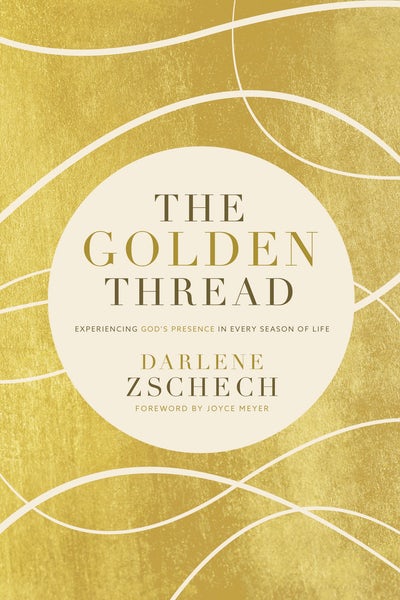 The Golden Thread is talking about that journey. It talks about the cancer journey and negotiating that with my theology, with my faith, how I was going to walk through this in a public space. Do I do this privately just for me and my family, or do we do this publicly and just trust God with the outcome and say if I live or die really, God, I win. Like, I had to reconcile those things.
The Golden Thread is talking about that journey. It talks about the cancer journey and negotiating that with my theology, with my faith, how I was going to walk through this in a public space. Do I do this privately just for me and my family, or do we do this publicly and just trust God with the outcome and say if I live or die really, God, I win. Like, I had to reconcile those things.
And so the greatest thing for me through all of this, the one thing has been the presence of God. And how do we describe the presence of God? You know for me, it was like this golden thread just weaving its way in and through everything, despite my feelings, despite my elation or my despair, despite my fear or my lack of faith, despite my . . . you know, sometimes I could be so kind. Other times I got angry: angry at where I found myself, frustrated. And despite all of that, there’s that golden thread of the presence of God just woven throughout the whole thing.
To be honest, it still takes my breath away. I just still can’t believe that He is so good, that He’s so good. And even there is so much chaos in the world and so much disappointment, the goodness of God, if you want to look for it, you’ll see it.
I’d been chasing this lump for a couple of years. I had many scans come back inconclusive. “Fatty tissue.” And I’m like “Welcome to the 40s! Welcome to fatty tissue. It’s how it rolls.” But it was giving me more concern.
I was with a friend Christmas shopping, and we were popping into this breast appointment. But the thing about this place is until you get conclusive, they don’t let you go home. And so I’m like, “We’ve got shopping to do. Can we hurry up?” You know, girls’ priorities.
But they went, “We need your biopsy.”
And the biopsy came through inconclusive.
I’m like “How can this be?” I’m like, I felt in my spirit that, “You need to stay.” So they did a biopsy all on the same day.
I’m like, “Put some music on! Put some worship music on!” You know, they have to clamp your flesh and take it out, and there’s no anesthetic or anything. So [my friend is] singing in my ear, I’m like, “Stop singing! It’s so bad!” And then she puts on this song that’s way too punchy. I’m like, “I don’t want any words!”
There was . . . I think it was a Jesus Culture song, and it was the instrumental of this song. It’s so powerful, and I just kept leaning in to, Oh my God, you’re going to have to transport me away from this place because I can’t do this right now.
“God, you’re going to have to transport me away from this place because I can’t do this right now.” – Darlene Zschech
So then after that, you’re feeling good. You’re like, Okay I’ve done this, right. I’m still got to go shopping. It’s funny what’s in the back of your mind.
And then the specialist called me in with my friend and said, “Is there someone who can pick your child up from school?”
And I’m like, “No.” Because I just knew what was coming. I said, “No, there’s not.”
She said, “No, you must have one person in your world.”
“Yes I do.”
And she said, “That’s good, because it’s come back, and you have breast cancer. From what we can see is that it is progressive. And you need to have surgery straight away.”
So that was on the 13th of December. On the 20th of December I had surgery.
I got back to home on Christmas Eve. My best friend—sorry, I get emotional—came and made the best Christmas Day for my family and my kids, because home is really important to me. And the doctors still visited me on Christmas Day. I was really sick. Yeah, God’s good.
Four weeks later, I was in chemo. And then I had seven months of really aggressive treatment.
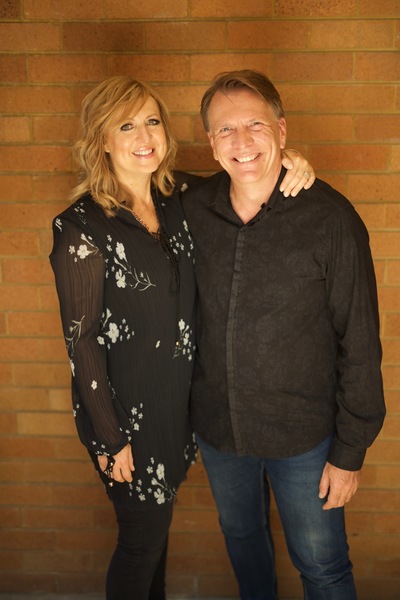 If you’re walking through a tough time, there were a few things I set in place, and my husband helped me set in place. Because sometimes people would come up and pray for me, they’d start praying and they’d start praying out their own fears, and I could feel it. “She’s going to die, but bless her, Lord. Lord, just your will is what we’re praying.”
If you’re walking through a tough time, there were a few things I set in place, and my husband helped me set in place. Because sometimes people would come up and pray for me, they’d start praying and they’d start praying out their own fears, and I could feel it. “She’s going to die, but bless her, Lord. Lord, just your will is what we’re praying.”
I had to learn to go, “Actually, unless you’re praying in faith over me, you need to stop praying right now.” And some people don’t even want to speak to me again because of how blunt I was, but I actually had to get very militant about what I would let in and what I wouldn’t let in. I’m a bit of a nice person, and sometimes being nice is not necessarily the best thing. I’ve had to learn this for my kids as well, how to be militant about who was around them because people would come up to them and burst into tears and be heavy on them. And that doesn’t help, you know, so be really careful with who you have around you.
Make sure there’s lots of joy in the home, and worship. When I was going through chemo, that was when Bethel put out, “You Made Me Brave.”
My girlfriend traveled a long way and she said, “You’re gonna listen to this song.”
And I, because I was coming to the end of chemo and it’s can be a cumulative, the effects of chemo, I’m thinking, I don’t know that I can do this again.
She came in she hopped into bed with me. “We’re going to listen to this song.”
“I don’t want to listen to this song”
She was like, “I don’t really care. You’re going to listen to this song, and you’re going to feel great.”
And I was like “You’re not being a good friend.”
She’s like, “Actually, I’m the best friend you got. Now listen to this song.”
And it was fantastic. That’s the people you need in your corner. You don’t need people who are, “Oh, you poor thing.” You need people who just making life normal.
I could hear my friends downstairs cooking, doing the ironing. Laughing with my kids. You know there was a lady that church that made—sorry, I get emotional—that made lunches for my kids every day so that I’ve never had to worry about school lunches. And it’s practical. It’s practical. And it’s so kind. And she was consistent—she’s a busy working mother. But that’s what she did for me and my family. I’ll never forget that.
That’s what you need in your world. If you don’t have it, find a church and tell them what you need. If it’s a good church, they’ll be there to help you.
Be really careful about what you say, careful about what you read. My family would not allow me to Google anything. No Dr. Google, because it’s always bad news. You’ve got protect your mind. Feed yourself with good things. Look after your body. Look after your soul.
“You’ve got protect your mind. Feed yourself with good things. Look after your body. Look after your soul.” – Darlene Zschech, on self-care during her cancer
The thing that I started doing as a teenager was praying the Psalms because they’re prayers. They’re poetry, they’re cries, they’re mountain tops and the valleys, which is our life. We all experience great things, and we all experience really tough things. The Psalms give us a way to voice what maybe you can’t find the way to voice yourself. You can open up the Bible and pray that prayer. You can join the Psalmist and write it to pray that prayer.
We have something we do at church—we just say “pray first.” Pray first, you know, rather than talk about it, [call] a friend about it, gossip about it, complain about it. Why don’t you pray first? And it’s amazing because God is a God who’s interested in us as individuals. And He says in James 4:8, “If you draw near to me, I will draw near to you.” So it’s really easy to learn how to just say, “Jesus, I don’t even know what to pray right now. But I need you to help me in this situation.”
It’s amazing when you start to understand that He’s a personal God, He’s not far off, waiting to get you to say the wrong words. He’s a personal God interested in your personal life, and He wants to walk with you. So we invite Him in. Pray first.
“He’s not far off, waiting to get you to say the wrong words. He’s a personal God interested in your personal life, and He wants to walk with you.” – Darlene Zschech
I really understand the power of prayer, and even more so as I get older. I’m following my grandparents’ footsteps. I love to pray for my grandchildren and my children, of course, but my grandchildren every every day because they’re growing up in a world that is quite chaotic. And you know, my greatest prayer is that they would have a really strong relationship with Jesus from an early age, so that that’s one thing that is the constant in their life. And rather than Jesus being an accessory, that He’s the center.
“Rather than Jesus being an accessory, that He’s the center [in their life].” – Darlene Zschech, on teaching her grandkids how to have a relationship with Jesus
There’s a few key scriptures in my life.
With this past challenge of cancer, Psalm 91, which says, “He who dwells in the secret place of the most high shall abide under the shadow of the Almighty.” I have feasted on those words in ways that I never knew I would need to. And it finishes with, “And with long life, I will satisfy you.” To be honest, I take it every day like I take my medication I’ve had to take for ten years. And I take Psalm 91, and I feast on it.
The Word, I think sometimes—and I’ve been guilty of it in the past—to looking at it is something I have to do. “Oh quick, I better get through my devotional.” I love devotionals. “I better get through it.” Rather than actually making the time and sitting, just even taking one line and rather than you reading it and really letting it impact you.
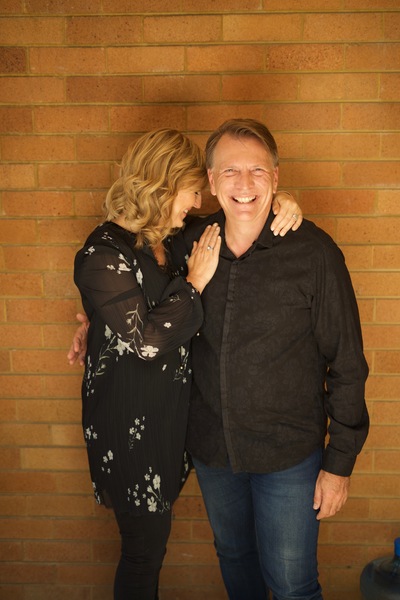 What I love about Jesus Calling, I firstly love that its bite size. I think that is masterful. But I love that it pulls Jesus really close. And when I think about Jesus Calling, I just think about some of the times with my own children, just reading some of these devotionals with them. For me, that’s really important that our children don’t see God as a far-off God. But Jesus Calling talking from the perspective of God speaking to you, that is a powerful, powerful concept to know and understand. So Jesus Calling provides that for us. I love how it provided that for me when I don’t have the words, but I can see it and actually be guaranteed that this is going to bring life and hope to my kids. And I think that’s amazing.
What I love about Jesus Calling, I firstly love that its bite size. I think that is masterful. But I love that it pulls Jesus really close. And when I think about Jesus Calling, I just think about some of the times with my own children, just reading some of these devotionals with them. For me, that’s really important that our children don’t see God as a far-off God. But Jesus Calling talking from the perspective of God speaking to you, that is a powerful, powerful concept to know and understand. So Jesus Calling provides that for us. I love how it provided that for me when I don’t have the words, but I can see it and actually be guaranteed that this is going to bring life and hope to my kids. And I think that’s amazing.
I was just thinking about the before, when Zoe was . . . before the cancer diagnosis, I went and bought her Jesus Calling for Kids. And it amazes me actually because she was 10 when I was diagnosed. And that’s a really critical age, that 8 to 10, you know. She had Jesus Calling for Kids by her bed, which is really powerful. So from 10 to about 11 and half, she suffered from anxiety, thinking her mom was going to die. And I love how out of this season . . . now if you saw Zoe Jewel, what has been birthed in her is a worshiper. I mean, she knows Jesus as her friend. Words like from this book that pull Jesus close, I think, are life-defining for us and for our children. So that kind of helps you dig your own wells and in tough times, you’ve got to learn to dig your well in God. I think this really helps us do that, and I’m ever grateful.
So I’m reading from December 1. And it says this:
“I love you with an everlasting Love, which flows out from the depths of eternity. Before you were born, I knew you. Ponder the awesome mystery of a Love that encompasses you from before birth to beyond the grave.
Modern man has lost the perspective of eternity. To distract himself from the gaping jaws of death, he engages in ceaseless activity and amusement. The practice of being still in My Presence is almost a lost art, yet it is this very stillness that enables you to experience My eternal Love. You need the certainty of My loving Presence in order to weather the storms of life. During times of severe testing, even the best theology can fail you if it isn’t accompanied by experiential knowledge of Me. The ultimate protection against sinking during life’s storms is devoting time to develop your friendship with Me.”
That’s me. That is, that is mine. And that is so perfect and so true.
I think through some of the tough times, you know, having a late miscarriage with a long awaited child drew me to my knees in a way I’d never experienced. Losing my dad. I think some of those tough seasons, they draw you to your knees and back to the Word in a way that changes your life.
And so for me, it’s really been about this journey of leaning into the Word, not finding my value from a platform. I think it’s a really dangerous place to find value in God is when you are just doing. I think it’s about being. “In Him I live and move and have my being,” not “my doing.” So that again has been an ongoing learning, especially when worship, the momentum of worship on the earth has been going like this.
“It’s really been about this journey of leaning into the Word, not finding my value from a platform.” – Darlene Zschech
I think it’s really important for those who lead in this sphere of worship, whether it’s a musician or even a production or whatever it is—if you are helping facilitate the song of God in people’s hearts, we’ve got to be careful that there is an engine room in your secret place that is fueling the things you are doing, because otherwise you’ll just get good at the doing and we forget about being.
So for me, there have been some critical times in my life. And as hard as it was in the moment on this side, I’m so grateful to God. I’m learning to trust Him on a deeper level, which is why I get so passionate about worship.
“I believe that the highest purpose for music is when it when it communicates and carries the presence of God, and when it allows our soul to give voice to sometimes the indescribable. And sometimes it’s only a melody that can help voice the cries of the human spirit.” – Darlene Zschech
Narrator: Darlene’s book The Golden Thread is available from your favorite book retailer today! You can also find her song “Shout to the Lord” on iTunes or your favorite music provider.
Narrator: Stay tuned for our chat with writer and teacher Margaret Feinberg after a brief message about a beautiful new edition of Jesus Calling!
Narrator: Are you looking to introduce a friend or loved one to the peace that can be found by spending time with God daily? There’s a beautiful new edition of Jesus Calling that makes a gorgeous gift for someone who might be seeking a new perspective for a new year. It’s the same Jesus Calling daily devotional that has inspired over 25 million readers, now updated with a lovely fabric cover and eye-catching foil with feminine floral touches. This elegant new version also features large text and written-out scripture verses with each passage.
For more information about this stunning new edition of Jesus Calling, visit JesusCalling.com/Botanical. That’s JesusCalling.com/botanical. Now, let’s get back to the second half of our program.
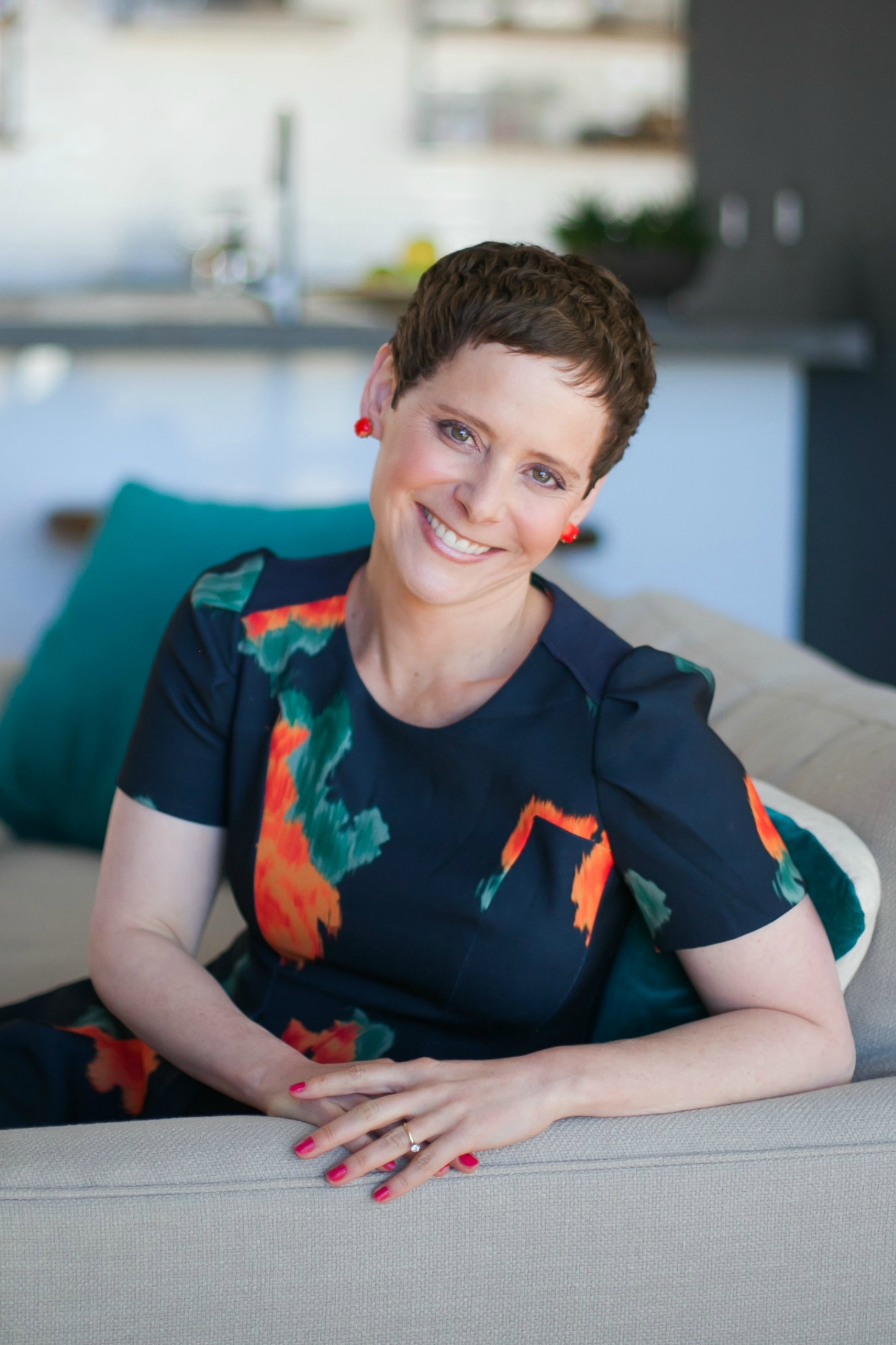 Narrator: Our next guest is beloved teacher and writer Margaret Feinberg. Margaret has been writing for more than 20 years. Today she tells us about her early experiences growing up with parents who moved around quite a bit, and how that shaped Margaret’s curiosity and love of exploring different people and cultures. Margaret uses that curiosity in her new book Taste and See: Discovering God Among Butchers, Bakers, and Fresh Food Makers, where she shares a culinary exploration of Scripture that profoundly changed the way she viewed gatherings around food forever.
Narrator: Our next guest is beloved teacher and writer Margaret Feinberg. Margaret has been writing for more than 20 years. Today she tells us about her early experiences growing up with parents who moved around quite a bit, and how that shaped Margaret’s curiosity and love of exploring different people and cultures. Margaret uses that curiosity in her new book Taste and See: Discovering God Among Butchers, Bakers, and Fresh Food Makers, where she shares a culinary exploration of Scripture that profoundly changed the way she viewed gatherings around food forever.
Margaret Feinberg: I’m Margaret Feinberg. And I have been writing for over two decades and take great pleasure in helping people recapture and discover the wonder of God and His Word.
The Gift of Learning Being with Different People and Different Cultures
I was raised by free-spirited parents who were a little hippie-ish and came to know Jesus in the Jesus movement back in the 1970s. And so I grew up with a Jewish father, who came to recognize Yeshua as the Messiah, and a Gentile mother. And at the end of the day I make a pretty great bowl of matzo ball soup.
My free-spirited parents were never content living in one place as we moved around a lot. And in each place they engaged in different professions. So my parents they made surfboards and had a surf shop down in Cocoa Beach, Florida. We then moved to Maggie Valley, North Carolina, where my mom was an elementary school teacher on the Cherokee Indian Reservation. We lived off the grid before it was cool and grew all of our own food and had our own water sources there for a number of years. And eventually we moved to Steamboat Springs, Colorado, where my parents became ski instructors for 17 years combined, and I even taught for five years as well. And then I eventually moved to Alaska, where I fell in love with my husband Leif.
I think all of that moving around as a kid really made me curious. I think that was one of the gifts to being exposed to different people, different cultures, different places.
I remember one semester during my freshman year, I went to a Christian conference and while I was there, it was like God grabbed me by the scruff of the neck and said, “You are my child. I have called you by name. Come back to Me.” And that led me to actually become a religion major focusing on New Testament studies.
I think there are specific encounters that we have with God that can really transform us. And I remember being at that Christian conference, and it had completely finished and I . . . I’ve never heard the audible voice of God. But there are times that a thought will pop into our head, and it is simply not our own. And when those happen, you should obviously check them out with scripture. If they don’t line up with God’s Word, you chuck them far out back.
“If [the thoughts popping into our head] don’t line up with God’s Word, you chuck them far out back.” – Margaret Feinberg
And I think that most of the things that God speaks to us—in fact, all of them—will call us to do one of two things, and probably both: to love God more and to love others more.
And the thought that popped into my mind was, “Go into the prayer room and look underneath the table.” So I—I did it. I remember going in and looking underneath the tables and the tablecloths. I remember looking—there were four tables, and I went to the first three and there was nothing. And then I went to the fourth table. I lifted it up, and there was a Bible sitting there, and it had the person’s name in it.
I remember going to the people who organized the conferences, saying, “Do you know this person?” And they said no.
Then I went online, and I researched. I kept asking people until I ran into a woman who said, “I know exactly whose Bible that is. And here is their phone number.”
I ended up taking a drive and returning that Bible. And along the way, I ended up giving someone a ride. But I remembered that moment thinking just how real and personal God is.
And so for me, that was a really transformational moment in experiencing God—not just knowing Him, not just praying to Him, not just talking to Him, but being invited to join God in what He is already doing in that moment.
“That was a really transformational moment in experiencing God—not just knowing Him, not just praying to Him, not just talking to Him, but being invited to join God in what He is already doing in that moment.” – Margaret Feinberg
Tasting and Seeing God’s Goodness
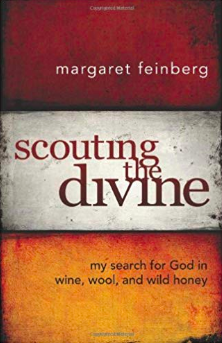 More than a decade ago, I wrote a book called Scouting the Divine: My Search for God in Wine, Wool, and Wild Honey. I went and spent time with a farmer, a beekeeper, a vintner or a grape grower, and a shepherd. With each of these people, I opened up the Bible and I asked, “How do you read these passages? Not as theologians, but in light of what you do every day?” And their answers changed the way I read the Bible forever. I mean, time and time again, I found myself asking, How have I grown up in the church, how have I listened to so many sermons, how have I listened to so many podcasts and nobody has told me these things?
More than a decade ago, I wrote a book called Scouting the Divine: My Search for God in Wine, Wool, and Wild Honey. I went and spent time with a farmer, a beekeeper, a vintner or a grape grower, and a shepherd. With each of these people, I opened up the Bible and I asked, “How do you read these passages? Not as theologians, but in light of what you do every day?” And their answers changed the way I read the Bible forever. I mean, time and time again, I found myself asking, How have I grown up in the church, how have I listened to so many sermons, how have I listened to so many podcasts and nobody has told me these things?
Well, at the end of that book and the Bible study, people [started] coming up and saying, “Why did you not spend time with an olive grower?” And I thought, I really wanted to do that. But there wasn’t time in this particular project.
So I have been sitting on that desire to go and spend time with an olive grower for 10 years. In essence, this book and Bible study have been ten years in the making. And just this past year, I felt that nudge of the Holy Spirit that whispered, “It is time.”
And so I sat out and began to zero in on six different foods in the Bible and people who plant, process, and procure them. And so I went 410 feet down into a salt mine, fished in the Galilee, brought in an olive harvest in Croatia, graduated with a certificate in Steakology 101 from a Texas butcher who calls himself “The Meat Apostle,” picked figs with a world-class fig farmer, and baked matzo in under 18 minutes with an expert on ancient grains at Yale University. With each person, again I asked the question, “How do you read the scriptures passages of the Bible in light of what you do every day?”
You know, one of the things that I was surprised by was, first of all, all of them. Each one, each food, whether it was harvesting olives or learning about a butcher’s work, which really ties back into Old Testament sacrifices and Christ coming as the rescuing lamb, or whether it’s the fig farmer in learning what Jesus means when He says to pay attention to the fig tree—that with each of these, they were so rich with depth and layers of meaning.
But I think one of the ones that sticks with me is my time going down 410 feet into a salt mine and beginning to understand that the salt that is described in the Bible is very different than the white chemically altered salt that we see on tables today.
Most of us when we encounter salt, we don’t really think about it. I mean, if you went to a restaurant and you asked for a salt shaker and someone said, “There’ll be an up charge for that,” you would probably think, What is going on here?
In ancient times, salt was actually harvested with its natural source. Whether that came from dehydrated salt from the sea, whether that came from lakes, where the salt had been harvested out, or whether it had come from salt mines. And in antiquity, the technology in order to harvest that salt made it difficult and expensive. And that was compounded with the high cost of transporting salt to where it could be used. And so salt was a treasure. It was something that was prized, it was something that was important. It was something that had the ability to transform the way that people ate. Because you have to remember, in that time there weren’t refrigeration systems. And so when they could take salt and apply it to meat or to fish something that would go bad in 24 to 36 hours in that hot climate could now last 4 or 6 or 12 months or longer, it was a game changer.
We went about 410 feet deep. We rode in a truck, and we entered this large, dark cavern. It was cut out like a square at first. And from the ceiling you could see the salt dripping down like stalactites of almost ice, except they were salt. And as we drove deeper and deeper, the the road would fork. And then there were these metal doors that would open up. But I remember I was told by my host Neal to pay attention because if something were to happen, we’d have to find our own way out. And I thought, There is no way I’m ever going to get out of this salt mine.
But as we drive down, the beams of the truck hit the sides of the walls and what I see is the most stunning picture. It is these white walls that are glittering, and it’s almost like that there are peach and pink, garnet and quartz and soft colored rubies embedded in. And that is the image of the salt with all of the surrounding minerals, like the iron or perhaps the magnesium or the darker hues.
And so when Jesus says that, “You are the salt of the earth,” He’s not referring to the chemically refined salt that we see today. He’s referring to the salt that they would have known in antiquity, and that salt was harvested with the surrounding minerals. It often had a hue much like we would see with Himalayan salt, where it had that pinkish or that little bit of a of peach color to it, or it might have a little bit of gray if it was harvested from the sea. And what we see is that the surrounding minerals gave us all its unique flavor, its unique color and its unique texture. Just in the same way when Christ says to us that you and I, we’re the salt of the earth, that each of us have our own unique backgrounds. The places where we were hewn from, our unique upbringings, our unique personalities, our unique shiftings, our unique strengths or unique weaknesses: God wants to use us as we are as flourishing agents, as preserving agents and as agents who are helping transform and flavor the world with the flavor of Christ.
“Every time we gather around the table, we are invited to taste and see God’s goodness, to taste and see His love, His presence, His connection, His attention to detail in each of our lives.” – Margaret Feinberg
Sarah Young is such a gift for such a time as this. The words that she pens connect God’s heart to our hearts, and the personal nature to her writing, it helps us to recognize that Christ is real and live and personal and involved and compassionate. I think the beauty of her work is that it helps challenge us when we struggle with our understanding of God and to realize that God is with us, that God is for us, and that God loves us madly that we would be madly in love with Him and with others.
I was an early reader of Jesus Calling and loved just her approach. I love that personal nature.
I love this one. Jesus Calling, November 12th:
This is a time of abundance in your life. Your cup runneth over with blessings. After plodding uphill for many weeks, you are now traipsing through lush meadows drenched in warm sunshine. I want you to enjoy to the full this time of ease and refreshment. I delight in providing it for you.
Sometimes My children hesitate to receive My good gifts with open hands. Feelings of false guilt creep in, telling them they don’t deserve to be so richly blessed. This is nonsense-thinking because no one deserves anything from Me. My kingdom is not about earning and deserving; it’s about believing and receiving.
When a child of Mine balks at accepting My gifts, I am deeply grieved. Then you receive My abundant blessings with a grateful heart, I rejoice. My pleasure in giving and your pleasure in receiving flow together in joyous harmony.
I love this passage, and it resonates so deeply with me in part because I think it captures the idea of tasting and seeing God’s goodness and love that this is a God who has good gifts for us. And He sends them to us in so many forms, even in the very food that we eat, that we begin to see that every good gift comes from above from a father in whom there is no darkness, in whom shines bright lights into the world and into our hearts, that we would fall more in love with Him.
Finding Community and God at the Table
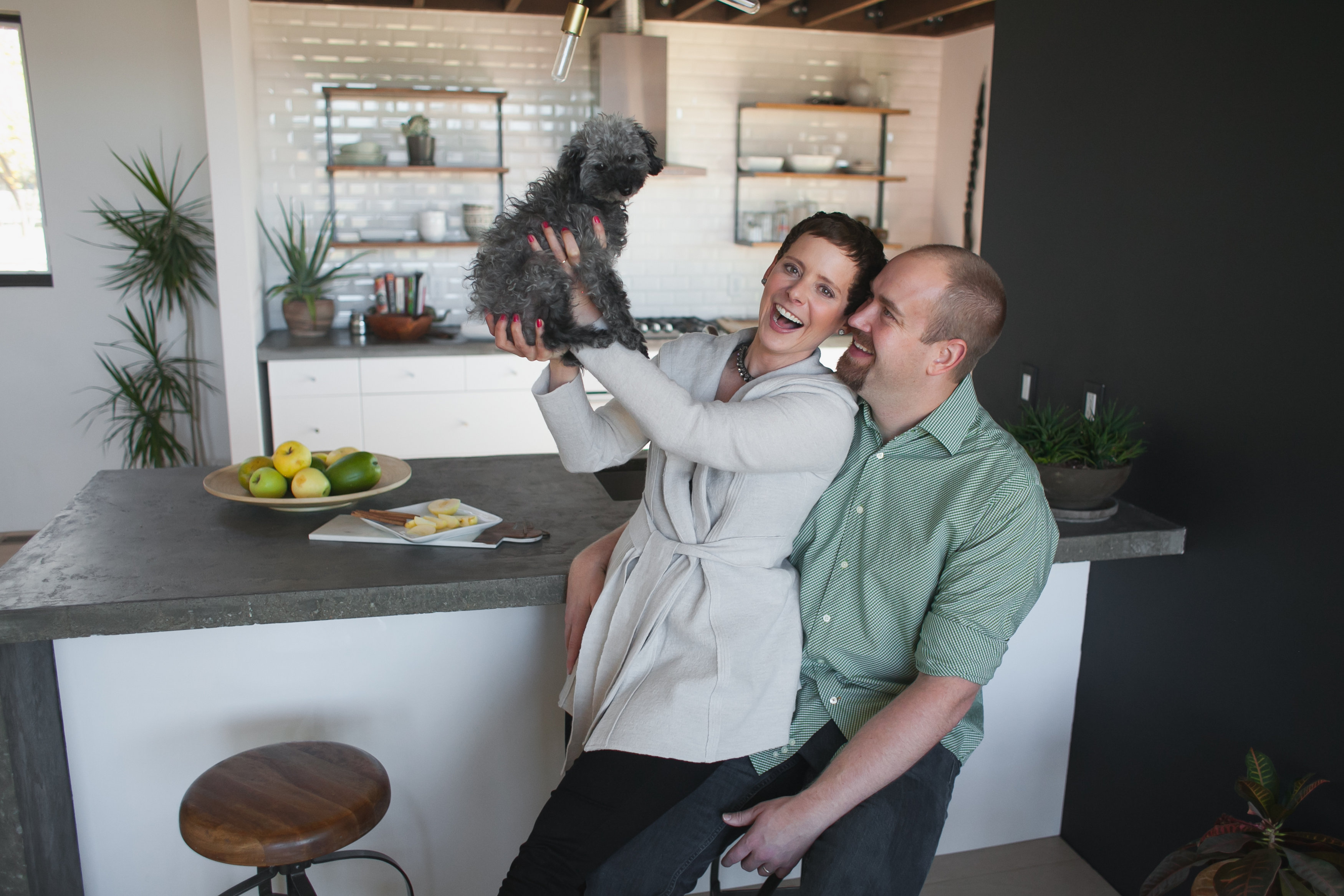 One of my husband Leif’s and I’s great joys is having people over. We thoroughly enjoy it. But I have to tell you that when we have people over, well it doesn’t have to be perfect. Any food that is curated with love will do, and sometimes love is ordering out. Sometimes love is the deli counter at the grocery store. Sometimes love is what you pull out of the freezer and throw in a crockpot.
One of my husband Leif’s and I’s great joys is having people over. We thoroughly enjoy it. But I have to tell you that when we have people over, well it doesn’t have to be perfect. Any food that is curated with love will do, and sometimes love is ordering out. Sometimes love is the deli counter at the grocery store. Sometimes love is what you pull out of the freezer and throw in a crockpot.
So it’s not the perfection of a meal or the perfection of a food that makes a warm loving transformative evening. At the end of the day, when we gather for a meal, it’s not really about the appetizer or the main course or possibly even the dessert. It’s about knowing and being known, about being vulnerable, about sharing, about being thoughtful, about being engaging.
“It’s not the perfection of a meal or the perfection of a food that makes a warm loving transformative evening.” – Margaret Feinberg
In antiquity bread was a communal act. In other words, among the majority of people—not the elite or the wealthy, but but for the average person who was a peasant—that they would go out and their family would be involved in the planting and the harvesting of the grains. That the family would be involved of the processing of those grains, the kneading of the bread, the blowing away of the chaff, the baking of the bread that was done in communal ovens.
And so that starts to shift the way that I and all of us look and engage in communion as a really a communal affair. That this is something that we partake of together as a community as an act of sacrifice, even in the bread that we eat. The sacrifice of those who have been involved just as they were today. Maybe they’re not in our own family anymore, but today for those who have planted and harvested and prepared that which we eat, that Christ invites us into a communal community with Him.
I think when we look at food in the Bible, we are reminded through the teachings of the Old Testament through the very presence of Christ that our dependence is on God.
All of humanity must eat in order to survive. And with every bite and every nibble, God reveals himself as the Sustainer, the one who hangs the stars and shines the moon and who radiates the reflection of the sun. The one who brings the season, the one who provides the life in the soil. With each bite, we are invited to remember God as our sustainer.
“With every bite and every nibble, God reveals himself as the Sustainer, the one who hangs the stars and shines the moon and who radiates the reflection of the sun…With each bite, we are invited to remember God as our sustainer.” – Margaret Feinberg
Narrator: You can find Margaret’s new book Taste and See at your favorite book retailer today!
[embedded content]
Narrator: Next time on the Jesus Calling Podcast, we speak with Heisman Trophy winner and NFL Hall of Fame wide receiver Tim Brown. What motivated much of Tim’s success in the early years of his life was a desire to reconcile with his father, after a misunderstanding when Tim was only 12 years old drove them apart for years and defined Tim’s path for over a decade.
Tim Brown: Man, is God in the middle of a father and son not talking for 12 years? Is God really in the middle of that? Some people may have a hard time believing that that’s the case. But I think when it turns out the way it turned out, I believe He is.
